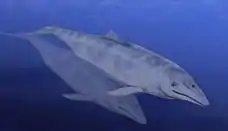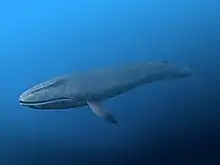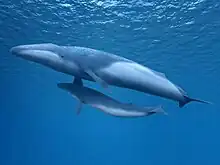Miocaperea
Miocaperea is an extinct genus of pygmy right whale from the Late Miocene Pisco Formation of Peru.[1] Its type species is Miocaperea pulchra.[2]
| Miocaperea Temporal range: Late Miocene ~ | |
|---|---|
| Scientific classification | |
| Domain: | Eukaryota |
| Kingdom: | Animalia |
| Phylum: | Chordata |
| Class: | Mammalia |
| Order: | Artiodactyla |
| Infraorder: | Cetacea |
| Family: | Cetotheriidae |
| Subfamily: | Neobalaeninae |
| Genus: | †Miocaperea Bisconti, 2012 |
| Species | |
|
†M. pulchra Bisconti, 2012 (type) | |
Evolution and significance
The discovery of Miocaperea is significant, because neobalaenines were previously unknown in the fossil record, except for an isolated petrosal (ear bone) from late Miocene-aged deposits in Australia.[3] A previous study placed the divergence date of Neobalaeninae from other mysticetes at about 23 million years,[4] and the age of Miocaperea lends credence to the notion of an origin for Neobalaeninae deep in the early Miocene.
References
- Miocaperea at Fossilworks.org
- Bisconti, M. 2012. Comparative osteology and phylogenetic relationships of Miocaperea pulchra, the first fossil pygmy right whale genus and species (Cetacea, Mysticeti, Neobalaenidae). Zoological Journal of the Linnean Society 166: 876-911.
- Fitzgerald, E.M.G. 2012. Possible neobalaenid from the Miocene of Australia implies a long evolutionary history for the pygmy right whale Caperea marginata (Cetacea, Mysticeti). Journal of Vertebrate Paleontology 32:976-980.
- Sasaki T, Nikaido M, Hamilton H et al. (2005) Mitochondrial phylogenetics and evolution of mysticete whales. Systematic Biology 54(1): 77–90.
This article is issued from Wikipedia. The text is licensed under Creative Commons - Attribution - Sharealike. Additional terms may apply for the media files.



